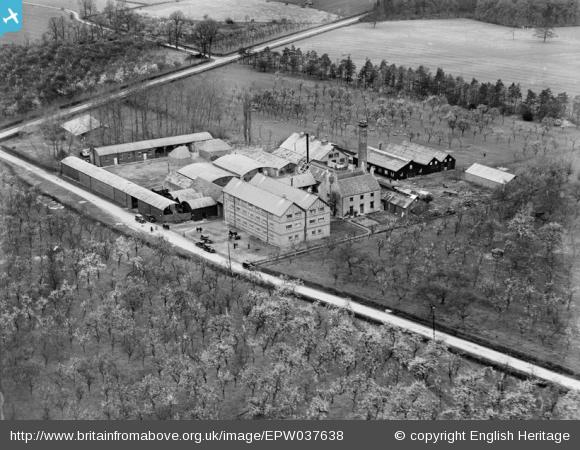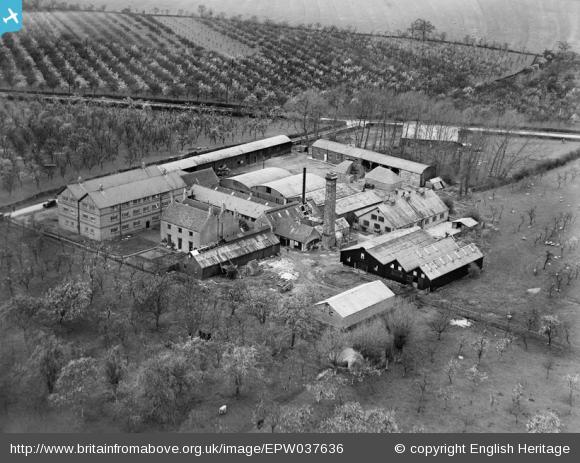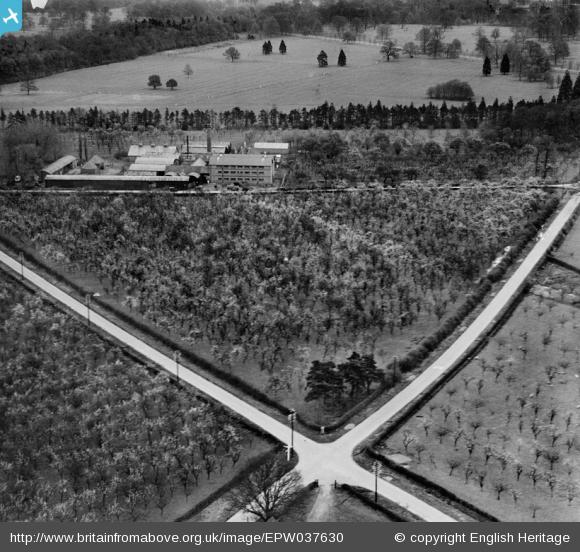Deakin's Naunton Field Jam and Canning Factory, Toddington, Gloucestershire
In April 1907, the Evesham Journal reported the opening of Deakin's canning factory at Naunton Field, Toddington, Gloucestershire. The canning factory was built on the site of the jam factory next to the main house - see photos below taken in 1932 showing the site amongst the orchards lining the Tewkesbury Road, Toddington. W.R. Deakin Limited used the factory for canning fruit and vegetables until the 1930s.
The canning factory was initially managed by George E. Deakin, a director of W.R. Deakin Ltd and brother of William R. Deakin (see below). John B. Deakin (son of William R. Deakin), who also managed the Deakin's Eclipse Preserving Works, Wigan, managed the canning factory during the First World War after George Deakin retired. After the war the factory was managed by William G. Deakin (John B. Deakin's brother).
The 1911 census records the following members of the Deakin family living in the house at Naunton Field:
William Robert Deakin, Head, Married, aged 48, Governing Director, Fruit Preserving Company
Mary Jane Deakin, Wife, Married, aged 53
John Bertram Deakin, Son, Single, aged 23, Factory Manager, Fruit Canning
William George Deakin, Son, single, aged 20, Farm Hand, Fruit Growing
Bessie Deakin, Daughter, aged 19
Robert Hartley Deakin, Son, aged 16
George Deakin, Son, aged 14
James Stanley Deakin, Son, aged 12
Bertha Simon, General Domestic Servant, aged 19
The surrounding orchards (originally owned by Lord Sudeley and then by the industrialist Hugh Andrews) provided the fruit for the canning factory and Beckford (on the Birmingham and Gloucester Railway connecting with Evesham where Deakin's had a private siding) and the Great Western Railway station at Toddington (which had opened in 1906) were used to transport the fruit and canned produce.
During the First World War Deakin's provided jam for the army and navy and the Toddington factory employed over 200 men and women including butchers as the factory also produced bully beef for the troops with supplies of meat arriving on drays from Toddington and Beckford stations. During the summer months casual labour supplemented the work force and local children were often involved in fruit picking taking time off school to do so.
During March 1917, 75 German prisoners, including a Sergeant-Major, 3 corporals and an interpreter (formerly a clerk in a London office) arrived at Toddington to work in the surrounding orchards. They were housed in huts behind barbed wire and sentries in the centre of the fruit area which had previously been used as accommodation for the seasonal workers. The prisoners worked 8 hours a day during the week and 4 hours on Saturdays tending to the orchards and picking fruit during the summer months. They were paid in accordance with The Hague Convention and received the extra food allowance granted to manual labourers. During the 1918 influenza epidemic, 4 prisoners lost their lives and they are buried in the churchyard nearby. See German prisoners arriving under guard at Toddington Fruit Farm
and Toddington Fruit Farm . The German prisoners orchestra in their quarters .In 1918, Morning Star Sundries Ltd of Leicester, purchased nearly 500 acres of orchard and plantations from Hugh Andrews. They built a canning factory at Park Farm, Toddington, which was officially opened Bank Holiday Monday, May 1919. The co-operative canned, preserved, bottled and dried fruit at Park Farm.
The surrounding orchards were grubbed up in the 1950s and the canning factory demolished. The site is now an industrial estate (Orchard Trading Estate) but one of the original brick sheds is still in existence.


